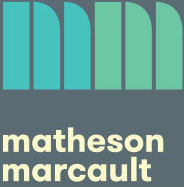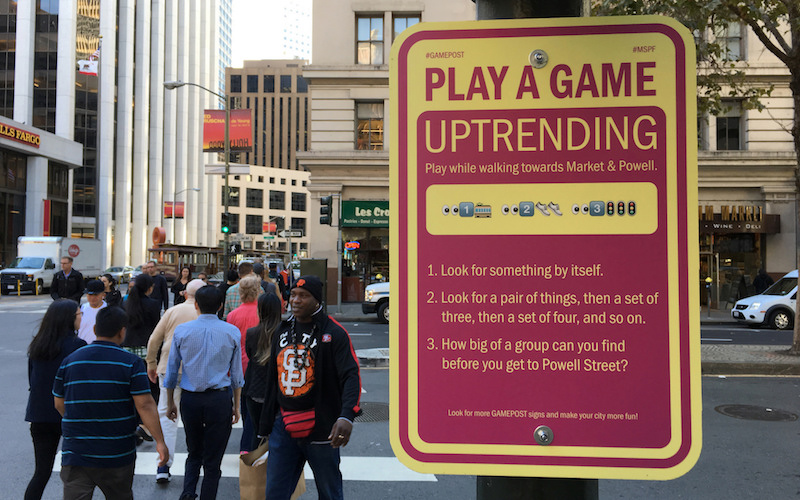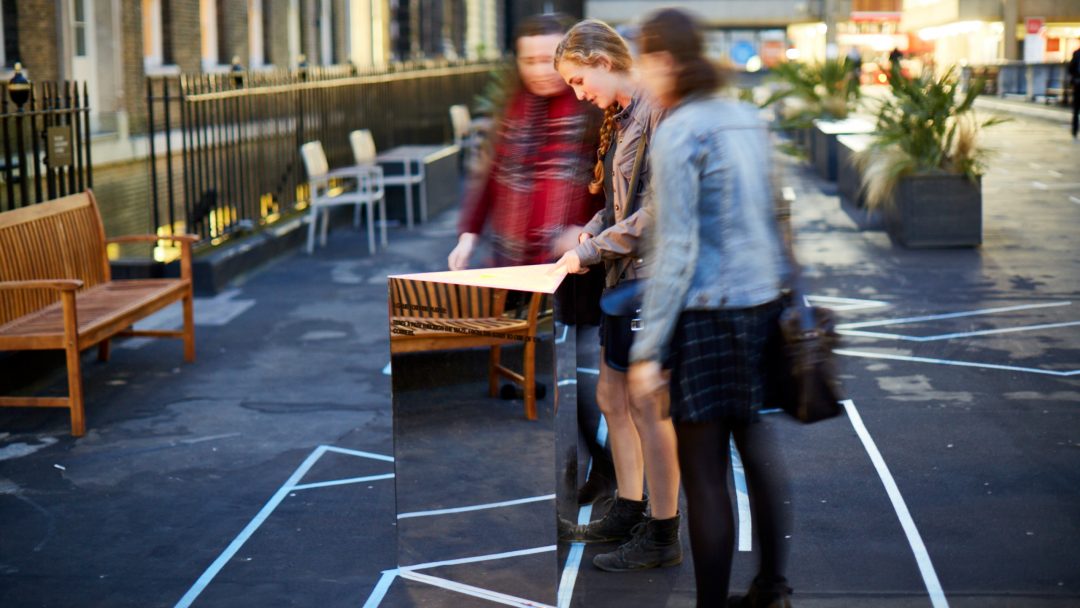We dropped the ball for a few months on writing roundups of interesting news and open calls relating to physical play. But it’s June! Summer! Bees are buzzing, flowers are flowering – what better time for playing, and/or for writing blog posts? (And if you’ve got anything happening in July/August we should include next month, or anything current we’ve missed here, drop us a line.)
Open Calls
There are at least a couple of calls out at the moment for games and playful proposals…
Playable Cities Oxford has put out information about “a brand new commission, challenging creatives from around the world to produce an idea that puts people and play at the heart of the city of Oxford”. There’s a £30,000 budget, and the call is open until 20 June.
Come Out and Play New York, the oldest pervasive games festival, is looking for games for their next festival, running in late July.
Conferences and Talks
Unless you already live in Hebden Bridge you might be too late for Feral Vector, the wonderful countryside all-types-of-games not-really-a-conference, which is happening right now (and also tomorrow). But if you aren’t there, you can follow along with some of the talks on twitter.
On 8 June, there’s a Playful Arts Session in ‘s-Hertogenbosch: an “evening where you can get acquainted with leading and emerging artists at the intersection of visual arts, performing arts and playful design”.
Lyst Summit runs 8-10 June in Copenhagen: a “conference and a cooperative prototyping environment focused on the arts and crafts of games”, looking in particular at romance, love and sex.
Saturday 24 June, in Walthamstow, sees an afternoon of discussion around Experimental Design and the Playful City. It “will include a workshop and an open-panel discussion with members of the local community, councilors and professionals who specialise in the fields of play, place making and the urban landscape”.
Exhibitions and Festivals
Another thing that’s on right now: the UK Games Expo at the NEC, featuring a whole lot of tabletop games, no really a lot. Plus you can pick up a copy of Tabletop Gaming magazine, which has a tiny article by us in it.
On 7 July, States of Play will open in Hull – a “new Crafts Council exhibition for Hull City of Culture 2017 which shows how play shapes our lives and the world around us”, with sixteen different games including new commissions and a collection of “installations and objects [that] invite us to play – either physically or in our imaginations”.
Mid-July will also see an exhibition on play at the Freud Museum: “Using storytelling, art works, oral histories and interactive games, this exhibition will explore play and its many meanings in psychoanalysis”.
Things to Play (or play with)
The Garden Museum commissioned a new board game, which is a really interesting thing for a museum to do, and it’s now been installed. We haven’t been able to find non-tweet documentation online anywhere but if we do we’ll update!
Jeppe Hein’s Modified Social Benches are back at the Southbank Centre for summer, and from 28 June they’ll be joined by his wonderful Appearing Rooms.
Time Run – often described as the best room escape game in London – will be closing on 21 August, so if you wanna play, now’s the time! Or if you want to open a new escape room while the position of “probably the best escape room in London” is briefly open, time it for late August I guess.
Further in the future – we’ll have to wait till September, in fact – this commission for the London Design Festival looks fascinating. Camille Walala’s Villa Walala is a “building-block castle” in Broadgate where “the component shapes are pinned to the ground and inflated by fans, transforming them from flat forms into a vast and immersive temporary island of shape and colour that begs to be explored, invites playfulness, relieves stress, and visually dominates the area”.
And finally: it’s degree show time! Which usually means there’s a ton of things around with interesting student games and interactive installations. In London there’s the LCC BA(Hons) Game Design show from 7-10 June, for example; and there’s a lot more that we just don’t have time to sort through, but tbh just turn up somewhere in E1 and walk around for twenty minutes and you’ll eventually find a warehouse full of some university course or other showing off its interaction design projects or scenography installations or live art, it’s a fun time of year for wandering. We’ve found at least a couple of people we’ve commissioned for Now Play This in the past just by poking our heads round a door and finding a degree show.
Things to Read
Analog Game Studies has an essay from Scott Nicholson on the precursors of escape room design. Sample sentence: “The haunt industry is moving into the escape room space quickly, as escape rooms provide another way for those who produce haunts to have themed experiences that are of interest to customers during the off season”. The haunt industry!
This essay on the “collaborative, interactive book art of the Russian Futurists” is short but intriguing. Sample sentence: “some pages require you to rotate the book to read the text; others invite multiple readings of the letters depending on whether your eye follows them across or down”. Lots of links to further information.
The 200 Word RPG Competition has produced a whole host of games with something simple and charming and game-poem-y about them, including lovely heist-game No Mistakes, Only Deeper Plans by Heather Robertson (if you made it to Now Play This you might have seen her post-apocalyptic 10,000 Years).
And the Market Street Prototyping Festival in San Francisco has once again published a report (PDF) with some really neat analysis of how people behave when you fill a city street with weird installations. Do they stop? How long for? How many people have come deliberately, how many are just walking by? It’s really great for a festival with this remit to have such dedication to performing a rigorous evaluation and then publishing it in a widely accessible form – it’s clearly a lot of work, and it means the impact of the prototyping process and the projects it covers can extend beyond the people involved directly in the festival. (The “Gamepost” image at the top of this post is by Josh Lee, and was part of 2016’s festival.)



